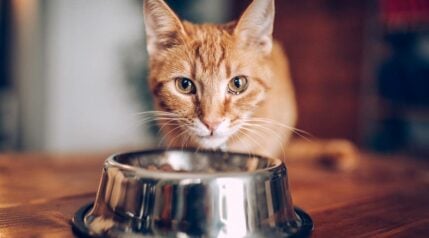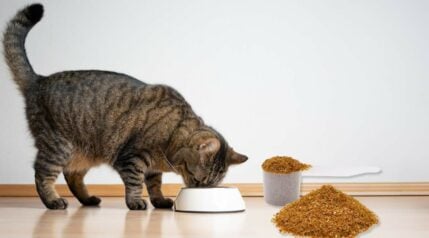When you purchase through links on our site, we may earn a commission. Here’s how it works.
It’s not uncommon for our furry friends to show interest in our food, but that doesn’t mean we should be feeding it to them. Still, if you accidentally drop a basil leaf on the floor or your cat gets into your basil plant, you’ll be relieved to know that basil is safe and non-toxic for felines.
Can cats eat basil? Technically, yes, cats can eat basil. Felines are obligate carnivores and thrive off a meat-based diet. While cats can and do eat other foods, their digestive systems are designed to pull nutrients from meat.
Basil is safe to feed your feline friend as an occasional treat but not every day. If you are a sucker for your cat’s pleading gaze, read on to learn more about basil and other safe herbs for your furry friend to eat.
Basil
A popular culinary herb, basil—known by the scientific name Ocimum Basilium—is cultivated in the United States for use as a fresh and dried cooking spice. This plant belongs to the Lamiaceae family, more commonly known as the mint family.
Basil is often used in Western dishes, where the term “basil” refers to sweet basil or Genovese basil. While there are up to 150 species of basil, we will be referring to the family as a whole in this article.
Basil is easy to grow; you may even have a plant growing in your kitchen garden right now! The dried or fresh herbs can be added to soups, salads, and sauces. Use basil as a topping for your favorite pizza and pasta dishes.
Basil has also been used in traditional Eastern medicine to treat anxiety and depression. Both St. John’s Wort and Holy Basil have been used in Ayurvedic medicine to support a positive mood, as well treating immune and digestive conditions.
Can Cats Eat Basil?

According to the Animal Society for the Prevention of Cruelty to Animals (ASPCA), basil is not toxic to cats. Yes, cats can eat basil, but only in moderation. The sweet and pungent aroma of basil may interest your cat enough to give it a nibble. Basil’s chewy texture appeals to some cats, and a leaf here and there is a wonderful way to please a curious kitty.
Since basil is non-toxic to cats, your cat should be able to eat any variety or preparation of basil. Fresh basil has a higher water content than dried basil, which may be more beneficial for your cat. Dried basil is more concentrated and will taste more intense than fresh basil.
While basil is considered non-toxic, avoid feeding your cat basil essential oil. According to the ASPCA, essential oils are incredibly concentrated and may be harmful to cats.
Is Basil Safe For Cats?
While basil is safe for cats, feeding your cat too much can cause diarrhea, vomiting, and other digestive issues. Diarrhea in cats can cause dehydration. Diarrhea is especially dangerous for cats since they tend to draw their water intake from their food. If your cat experiences persistent diarrhea after eating basil, it’s time to call the vet.
Avoid using basil essential oil around your cat. This includes feeding, applying topically, or even diffusing. Basil essential oil contains a high level of phenols, which are beneficial to humans thanks to their antioxidant function but can cause liver damage in your feline.
In rare cases, your furry friend may also be allergic to basil. An allergic reaction to basil may manifest as vomiting, difficulty breathing, hives, and swelling. Contact your veterinarian immediately if your cat displays allergic reaction symptoms.
Is Basil Good For Cats?
Basil contains several vitamins and minerals, including calcium, vitamin A, vitamin K, magnesium, iron, and potassium. According to WebMD, this herb offers a variety of health benefits for humans.
Basil contains the antioxidants zeaxanthin and lutein, which are excellent for eye function. It has anti-inflammatory and antibacterial properties to support your immune system. Basil also contains essential oils and antioxidants that fight free radicals in the body, preventing cellular damage and reducing your risk of cancer, heart disease, diabetes, and arthritis.
Can cats reap the benefits of basil? Cats need high-protein, meat-based cat food as part of a healthy diet. As cats are carnivores, their body doesn’t digest basil the same way as humans. This means your cat may be unable to absorb and utilize the nutrients found in basil.
Furthermore, too much basil may alter your cat’s nutrition and cause dietary imbalance. Treat basil as what it is—a treat—and only give your cat small amounts.
Talk with your vet if you are worried about your cat’s nutritional and health needs. Discuss pet foods and supplements that can give your kitty a dietary edge.
Do Cats Like Basil
Basil’s pungent smell is likely to intrigue your cat. From there, it is a personal preference. Your cat may love the chewy texture of basil, or they may spit the leaf out after a quick investigation.
When preparing basil for your cat, start with a small amount. Give your cat a single leaf and watch for any signs of digestive upset. While uncommon, cats can be allergic to basil. If your cat shows signs of an allergic reaction, seek medical attention immediately.
Alternatives To Basil
If you love treating your best pal to flavor-packed herbs, explore the following culinary and medicinal herbs to spice up your cat’s life. It’s a fun experiment to see how cats react to certain foods. Some herbs like catnip, valerian, and silver vine may drive your cat wild. Other herbs, like echinacea and goldenseal, offer immune support.
According to 2022 research first published in Veterinary Medicine and Science, turmeric may have a positive effect on cats suffering from mild to moderate osteoarthritis. Include this herb in your cat diet to see more playtime in older cats.
Overall, herbs can be a healthy treat that deepens the bond between you and your furry friend.
Other Culinary Herbs Cats Can Eat:
- Cilantro
- Dill
- Common Thyme
- Rosemary
- Sage
Other Medicinal Herbs For Your Cat:
- Ashwagandha
- Calendula
- Cat Grass
- Cat Thyme
- Catnip
- Echinacea
- Goldenseal
- Hemp
- Silver Vine
- Turmeric
- Valerian
Frequently Asked Questions
What Herbs Are Toxic To Cats?
The herbs that are toxic to cats include:
Is Thai Basil Poisonous To Cats?
According to the ASPCA, Thai Basil, Sweet Basil, and Saint Joseph’s Wort are all safe for cats.
Is Holy Basil Safe For Cats?
Holy Basil, or Tulsi, is safe for cats and may support your cat’s overall health. While sweet basil and holy basil belong to the same Lamiaceae family, they have different properties and uses. Holy Basil is a popular herb in Ayurveda, an ancient alternative medical system founded in India. Use Holy Basil to relieve gastrointestinal distress, support the immune system, and calm a hyperactive or stressed kitty.
What Other Human Foods Are Safe For Cats?
We’ve compiled a list of human foods that are safe for cats to eat.
Final Thoughts
Basil is a non-toxic food that is safe for cats in moderation. If you are interested in treating your kitty to a basil leaf, you can do so without fear of hurting your furry friend. As with any new food, introduce a small piece to your cat and watch for adverse reactions.





